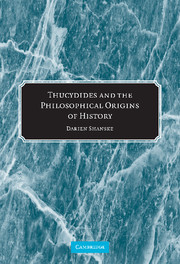Book contents
- Frontmatter
- Contents
- Acknowledgments
- Introduction
- 1 Thucydides's Vision
- 2 The Case of Pericles
- 3 Deinon, Logos, and the Tragic Question Concerning the Human
- 4 Thucydidean Temporality
- Appendix I Restoring Key Terms 1.1–1.23
- Appendix II Pretragic History of Deinon
- Appendix III Wittgenstein on Fly-Bottles, Aspect Seeing, and History
- Appendix IV Heidegger on World and Originary Temporality
- Notes
- Bibliography
- Index
1 - Thucydides's Vision
Published online by Cambridge University Press: 19 August 2009
- Frontmatter
- Contents
- Acknowledgments
- Introduction
- 1 Thucydides's Vision
- 2 The Case of Pericles
- 3 Deinon, Logos, and the Tragic Question Concerning the Human
- 4 Thucydidean Temporality
- Appendix I Restoring Key Terms 1.1–1.23
- Appendix II Pretragic History of Deinon
- Appendix III Wittgenstein on Fly-Bottles, Aspect Seeing, and History
- Appendix IV Heidegger on World and Originary Temporality
- Notes
- Bibliography
- Index
Summary
Introduction – Six Features of Thucydides's Text
This chapter focuses primarily on how it is that Thucydides begins a work that discloses a world. The beginning represents the essence of the conjuring trick; it is the lip of the fly-bottle and so it must entice, even as it is comfortably familiar, while all the while it is a step into something very different. Yet before we can lay out the first steps into the fly-bottle, we must have a better grasp of what it is like within or we will not know when we have entered. Our first task then is to identify the features of Thucydides's text that are world-disclosing.
For this task, we first return to Chios and to the passage with which we began:
After this [battle], the Chians [now under siege] no longer came out against [the Athenians], though the Athenians ravaged their land, their land being well stocked and untouched from the time of the Persian wars until now. For, next to the Spartans, I have observed only the Chians being both fortunate [verbal form of eudaimonia] and moderate [verbal form of sophrosune], and to the extent that their polis prospered, to that extent they ordered [their polis] more securely. And even as regards this revolt, [for people] might think they did it contrary to the safer path, but they did not dare to do it until they would be putting themselves in danger with many good allies and observing that, after the disaster in Sicily, not even the Athenians themselves denied any longer that their affairs were entirely and certainly desperate.[…]
- Type
- Chapter
- Information
- Thucydides and the Philosophical Origins of History , pp. 15 - 40Publisher: Cambridge University PressPrint publication year: 2006

